To Wiki or NOT to Wiki...Is That The Question?
On Wikis and Wikipedia
While taking the graduate course "The New New Media: Weblogs, Wikis, RSS, and Emerging Social Media" with Professor Robert Berkman over the summer, when the week came to learn about the nature of Wikis, we were given an assignment that was a real eye opener.
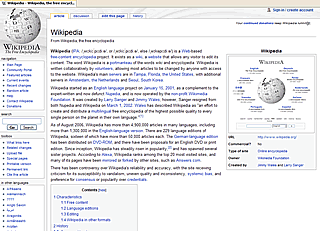
In the beginning, I was skeptical about Wiki's when we studied this medium simply from the nature of the medium and how it is run--that anyone may add to, or edit, any existing entry. As a class assignment, we were tasked with a research assignment on any subject we felt we knew a lot about. Since I felt I knew a lot about Basset Hounds from having had a beloved Basset in the family for many years, I chose this breed as a means to check for inaccuracies -- I felt fairly confident as a fact checker because I have first-hand experience with our family Basset Hound along with personal conversations with breeders and other Basset Hound owners. We were to compare the entry on Wikipedia online from a traditional encyclopedia entry, whether in print or online. I chose the Encyclopedia Britannica online.
Disappointed with the limited information on the breed on Encylopedia Britannica online, I signed up for the free trial so that I could see more of the original entry, reserved for members only. I was even more disappointed. There wasn't much information beyond the original entry. Plus I was distracted by all of the ads on the page -- as shown on the screenshot below.
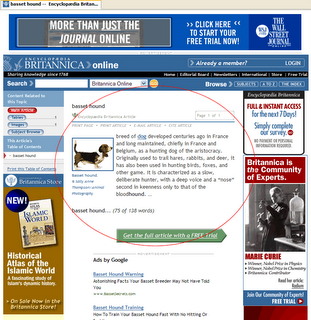
Encyclopedia Britannica provided the following information with one small photograph of the Basset Hound:
"breed of dog developed centuries ago in France and long maintained, chiefly in France and Belgium, as a hunting dog of the aristocracy. Originally used to trail hares, rabbits, and deer, it has also been used in hunting birds, foxes, and other game. It is characterized as a slow, deliberate hunter, with a deep voice and a “nose” second in keenness only to that of the bloodhound. …"In contrast, the Wikipedia entry was extensive and thorough -- an entire page full of facts and interesting information -- truly I was surprised and delighted. And I liked the fact that there were no ads on the Wikipedia entry -- or any Wikipedia entry for that matter. I found the information accurate to my knowledge based on my own experiences with the breed. I was very impressed with the extent to which many individuals have contributed their knowledge about Basset Hounds on Wikipedia. The Wikipedia entry included information about the breed's appearance, temperament, history, health and care, training, popular culture, and external links. Below are screenshots of the entire page devoted to Basset Hounds on Wikipedia.
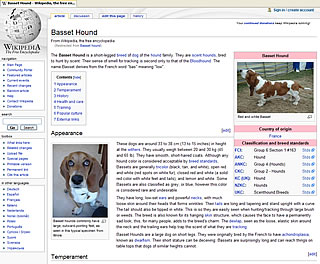
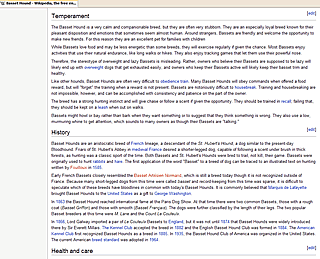
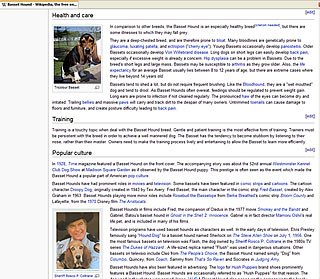
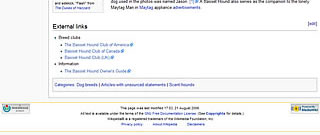
I have since changed my mind about the value of Wikipedia as a source of information. While all encyclopedias including both Wikipedia and the more traditional encyclopedias such as Encyclopedia Britannica have their shortcomings, including inaccuracies, I will not hesitate to use the Wikipedia as a source of information in the future. As a graduate student, however, I am trained to do extensive research and not to rely on just one source, which is my advice to anyone conducting research. I will continue to research information thoroughly from a wide variety of sources including the invisible web, academic databases available to M.A. in Media Studies students through our University portal, etc., Google Scholar, etc. I would suggest the same to any graduate student. However, I will continue to use the Wikipedia as a fairly reliable source of information and look forward to continuing to use it for research and fact-checking purposes.
Although the Wikipedia has its shortcomings and inaccuracies, which are also inherent in the traditional encylopedias by the way, as a whole, the class reacted very favorably with the entries on Wikipedia as compared to a traditional encyclopedia entry. The entries on Wikipedia in most researched cases appeared to be more extensive as well for several students. The Wikipedia, I learned, is a great example of the phenomenon James Surowiecki talks about in his book, "The Wisdom of Crowds." Fascinating phenomenon!

Class Wiki
We also created a class Wiki which will eventually be integrated as part of the M.A. in Media Studies program -- an important addition that will help students be more "hands on" about studying the various emerging social mediums on the Web. It is a vital part of being a graduate student in the M.A. in Media Studies program. Any and all media studies graduate students are encouraged to contribute to the class Wiki.
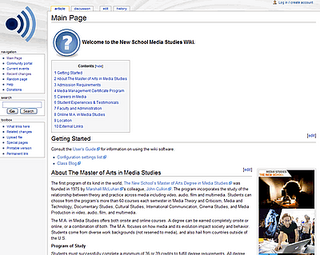
If you are a current graduate student in the program, please feel free to contribute to the class Wiki any knowledge you have about the M.A. in Media Studies program, any inside information you may have about student resources such as the best coffee shops to hang out and meet other students, any favorite local restaurants, etc., -- anything you'd like to contribute to help other graduate students who reside in NYC or live remotely. This is what the class Wiki was created for and what it is all about -- helping each other feel more connected with the University and with each other while providing another voice that is at the same time many voices.
You may also add your personal experiences and reflections about the M.A. in Media Studies program in the class Wiki under "Student Experiences and Testimonials." We'd love to hear from you!


0 Comments:
Post a Comment
<< Home